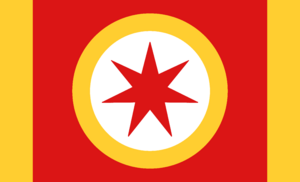Fravina
This article is incomplete because it is pending further input from participants, or it is a work-in-progress by one author. Please comment on this article's talk page to share your input, comments and questions. Note: To contribute to this article, you may need to seek help from the author(s) of this page. |
Federal Republic of Fravina République Fédérale de Fravina | |
|---|---|
|
Flag | |
| Motto: Une Nation, Prospérer Ensemble One Nation, Prosper Together | |
| Anthem: "La Varsovienne" | |
| Capital and largest city | Port de Sang |
| Official languages | French |
| Demonym(s) | Fravinan (singular)
Fravinans (plural) Fravi (adjective) |
| Government | semi-direct democratic federal republic |
| Bernard Beaumont | |
| Adelie Grasse Valentine LaClaire Jean Martin Louise Rochefort | |
| Legislature | People's Council |
| Wing of Examination | |
| Wing of Legislation | |
| Establishment | |
• Declaration of Fravi Independence | 29 March, 1765 |
• First Republic | 22 November, 1773 |
• Empire of Fravina | 15 October, 1887 |
• Second Republic | 15 October, 1948 |
| Population | |
• 2019 census | 37,654,800 |
| GDP (nominal) | 2019 estimate |
• Total | 434,829,346,344 |
• Per capita | 11,547.78 |
| Currency | aure |
| Date format | dd-mm-yyyy |
Fravina (French: Fravina), officially the Federal Republic of Fravina (French: République Fédérale de Fravina) is a country on Eurth.
Fravina is a semi-direct democratic federal republic, with three separate branches of government and a bicameral legislature, called the People's Council of Fravina. The nation's executive branch is headed by the president and four vice presidents, known as the Vice Presidential Council.
History
Indigenous peoples and pre-colonial era
Europan colonization
Independence
First Republic
Empire of Fravina
Civil War and Socialist Revolution
Second Republic
Geography
Climate
Environment
Politics and Government
Fravina is a semi-direct democratic federal republic, with three separate branches of government and a bicameral legislature, called the People's Council of Fravina. The nation's executive branch is headed by the president and four vice presidents, known as the Vice Presidential Council. Fravina's judicial branch is made up of a series of courts, with the Supreme Court acting as the highest court of appeals in Fravina.
Political Divisions
Fravina is principally divided into 6 provinces.
Political Parties and Elections
The government of Fravina officially recognizes six national political parties. This includes the Socialist Party, the Social Labour Party, the Liberal Party , the Conservative Party, the Capitalist Party, and the National People's Party. Legislative elections are held every 5 years on the second weekend of December, and examination elections are held every 10 years on the second weekend of December. These elections determine the seats of the People's Council, of which the majority coalition of the Wing of Legislation forms the government. The last time Fravina failed to form a government was following the 2010 election, which led Fravina to be without an executive until the 2015 election, when Red Flag Coalition retook control of the Wing of Legislation.
In Fravina, there are two major political coalitions. The Red Flag Coalition is a leftist coalition of the Socialist Party and the Social Labour Party. The United Center Coalition is a centrist coalition of the Liberal Party, the Conservative Party, and the Capitalist Party. The National People's Party, which is consiered far-right, is the only national party that is not part of any major coalition.
Social Labour Bernard Beaumont, winner of the 2015 and 2020 elections and former vice president, is serving as the 8th President of Fravina. The four vice presidents are Adelie Grasse, Jean Martin, Louise Rochefort, and socialist Valentine LaClaire. Leadership of the Wing of Examination is Chief Examiner Antoine Cartier. Leadership of the Wing of Legislation is Chief Legiislator Ella Lambert.
In the 16th People's Council of Fravina, the Wing of Legislation and Wing of Examination are controlled by the Red Flag Caucus. The Wing of Examination consists of 82 Social Labour seats, 20 Conservative seats, 19 Liberal seats, 13 National People's seats, 10 Capitalist seats, and 7 Socialist seats. The Wing of Legislation consists of 191 Social Labour seats, 54 National People's seats, 52 Socialist seats, 31 Conservative seats, 31 Liberal seats, 13 Capitalist seat, and 3 independent seats. Of provincial governors, there are 3 Social Labourers, 2 Liberals, and 1 Conservative.

